The Best Plant-Based Burgers: Brands to Choose and Avoid
Plant-based burgers are growing in popularity thanks to some help from national fast-food chains. But, are these plant-based burgers healthy, and which ones are the best tasting along with being macro-friendly?
In this article, I’ll take a look at the major plant-based burger brands and offer my opinion.
When coaching my vegan clients most of them struggle with the right protein balance and while all of these are pretty processed they can be an occasional part of a healthy plant-based diet and used to help hit the daily protein macro target.
Meatless Burger Comparison
There are hundreds of meatless burgers available but for this article, I’m looking at the ones that are designed to taste and have the texture of ground beef.
I’ve tried a few of them and some even “bleed” when grilling them which is so strange. However, I’ve been super impressed with the flavor and texture these vegetarian products offer.
Impossible Burger
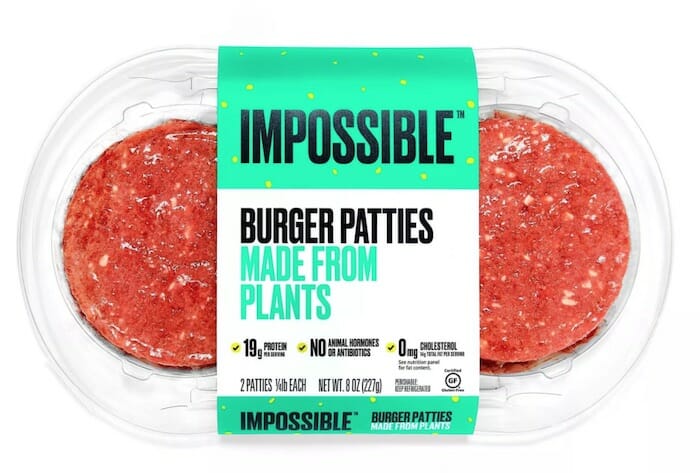
Impossible was one of the first to revolutionize the meatless burger patty. Because their product tasted so good they were able to score huge contracts with fast-food restaurants like Burger King.
Ingredients: Water, Soy Protein Concentrate, Coconut Oil, Sunflower Oil, Natural Flavors, 2% Or Less Of Potato Protein, Methylcellulose, Yeast Extract, Cultured Dextrose, Food Starch Modified, Soy Leghemoglobin, Salt, Mixed Tocopherols (Antioxidant), Soy Protein Isolate Vitamins & Minerals: Zinc Gluconate, Thiamine Hydrochloride (Vitamin B1), Niacin, Pyridoxine Hydrochloride (Vitamin B6), Riboflavin (Vitamin B2), Vitamin B12
Macro breakdown per 4 oz burger
- 240 calories
- 9 g carbs
- 3 grams fiber
- 19 g protein
- 14 g fat
Pros: Gluten-free and a good macro ratio. Available in most grocery stores.
Cons: Soy is the main ingredient which could be problematic for some consumers.
Taste: I tried Impossible and they’re pretty delicious and have a great texture as well.
Beyond Burger
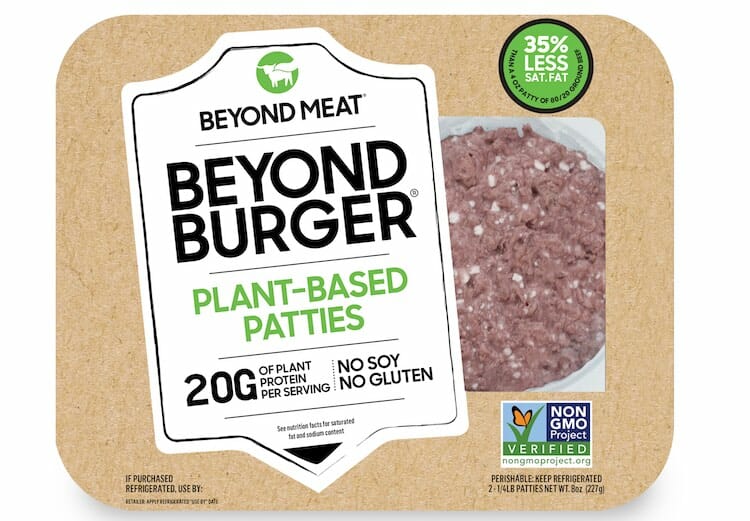
Beyond Burger was another one of the first “next-generation” meat substitute patties. It also scored high in the taste department and won contracts with restaurants like Denny’s, Carl Jr. /Hardee’s, and many others.
Ingredients: Water, Pea Protein, Expeller-Pressed Canola Oil, Refined Coconut Oil, Rice Protein, Natural Flavors, Cocoa Butter, Mung Bean Protein, Methylcellulose, Potato Starch, Apple Extract, Pomegranate Extract, Salt, Potassium Chloride, Vinegar, Lemon Juice Concentrate, Sunflower Lecithin, Beet Juice Extract (for Color).
Macro breakdown per 4 oz burger
- 260 calories
- 5 g carbs
- 2 grams fiber
- 19 g protein
- 18 g fat
Pros: Gluten-free. Available in most grocery stores. No Soy.
Cons: The fat macro is a little high.
Taste: These have mostly great reviews from people who tried them. I’ve tried the crumbles but didn’t like those.
Morningstar Incogmeato
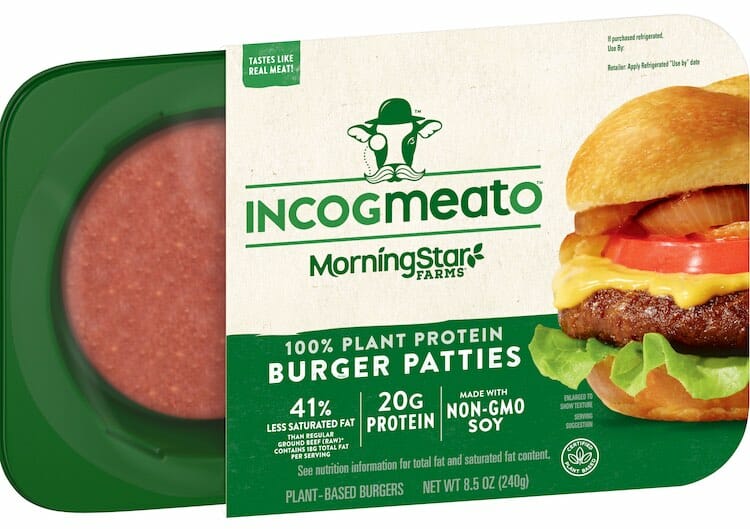
Morning Star has been making veggie meatless patties for years but their older products never really had the beef burger taste or texture. Incogmeato is their attempt at solving that problem to compete with the other big players.
Ingredients: Water, soy protein concentrate, canola oil, palm oil, methylcellulose, contains 2% or less of natural flavors, potato starch, dextrose, salt, cultured dextrose for freshness, apple juice powder (color), yeast extract, cornstarch, sunflower lecithin, vegetable juice concentrate (color), vegetable juice (color), pectin, citric acid, vitamin b1 (thiamin hydrochloride), vitamin b12, ascorbic acid for freshness.
Macro breakdown per 4.2 oz burger
- 250 calories
- 12 g carbs
- 8 grams fiber
- 21 g protein
- 18 g fat
Pros: High in protein and fiber.
Cons: The fat macro is a little high and soy is the primary ingredient which could be problematic for some.
Taste: People describe these as “bland” and “dry”.
Gardein Ultimate Plant-Based Burger
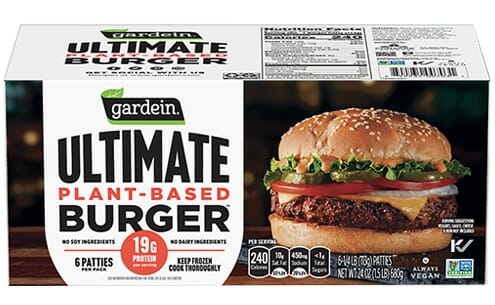
Gardein has a lot of meat alternative products on the market and has been around for some time. Ultimate is their attempt to complete with Impossible and Beyond.
Ingredients: Water, Textured Pea Protein, Coconut Oil, Textured Wheat Protein (Wheat Gluten, Wheat Flour), Vital Wheat Gluten, 2% or less of Methylcellulose, Natural Flavors, Barley Malt Extract, Garlic Powder, Salt, Yeast Extract, Onion Powder, Black Pepper, Beet Juice (Color Added), Lactic Acid.
Macro breakdown per 4 oz burger
- 210 calories
- 7 g carbs
- 1 g fiber
- 20 g protein
- 11 g fat
Pros: One of the best macro ratios compared to other brands and no soy. Less Methylcellulose filler than other brands. (This is the fiber content.)
Cons: These contain gluten as a protein source.
Taste: These have mixed reviews. Some people really like them while other people really hated them.
OZO Burgers
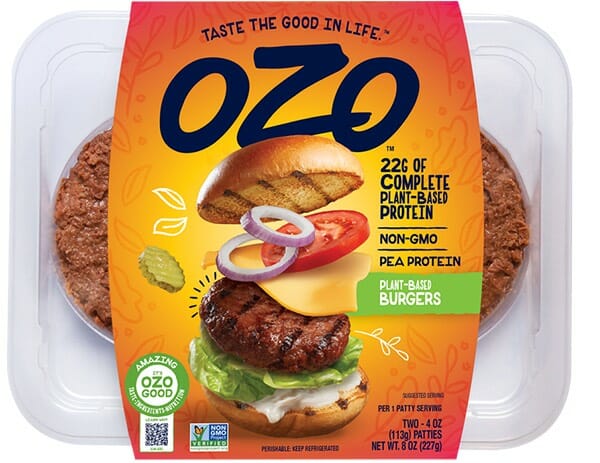
OZO uses a different approach to creating its plant-based burger. They ferment the plant protein with shitake mushrooms to improve the texture.
Ingredients: Water, Textured Pea Protein Blend (Textured Pea Protein, Pea And Rice Protein Fermented By Shiitake Mycelia, Pea Fiber), Canola Oil, Sustainable Palm Oil, contains less than 2% of: Steamed Chickpea Flour, Pea Protein Powder, Salt, Vegetable And Fruit Juice (Color), Rosemary Extract, Yeast Extract, Natural Flavor, Methylcellulose.
Macro breakdown per 4 oz burger
- 210 calories
- 8 g carbs
- 0 g fiber
- 22 g protein
- 11 g fat
Pros: One of the highest in protein of the brands compared here. Less Methylcellulose filler than other brands. (This is the fiber content.) Gluten and soy free.
Cons: These contain mushrooms which could be a problem for some people and they use palm oil.
Taste: These have mostly good reviews but the flavor is described as “unique” because of the mushrooms. If you expect them to “taste like beef”, you’ll be disappointed according to a Safeway food blogger.
Simple Truth Emerge Patties
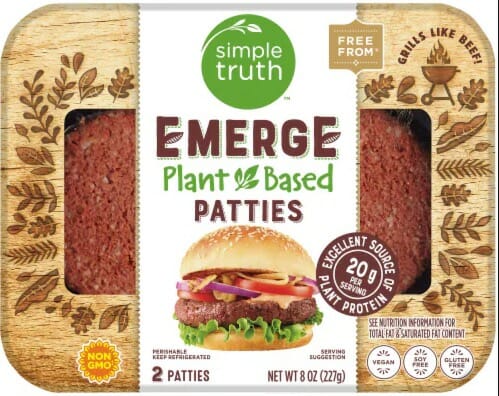
Simple Truth Emerge is the discounted “store brand” in Kroger-owned grocery stores. Therefore, they are more affordable than other meatless burger options.
Ingredients: Water, Soy Protein Concentrate, Canola Oil, Isolated Soy Protein, Wheat Gluten, Wheat Starch, Coconut Fat, Natural Flavors, Maltodextrin, Yeast Extract, Salt, Spices, Methylcellulose, Vegetable Juice ( Color ), Fruit Juice ( Color ), Citric Acid, Cultured Dextrose, Arabic Gum, Grill Flavor, Onion Powder, Corn Starch, Smoke Flavor, Sodium Alginate, Sodium Citrate
Macro breakdown per 4 oz burger
- 270 calories
- 9 g carbs
- 1 g fiber
- 20 g protein
- 17 g fat
Pros: More affordable than other options and high in protein.
Cons: These contain gluten and soy and are higher in fat than other options. I’m not sure why “grill flavor” is needed.
Taste: These have mostly good reviews but the flavor is described as “unique” because of the mushrooms. If you expect them to “taste like beef”, you’ll be disappointed according to a Safeway food blogger.
Alpha Burger Original Beefy
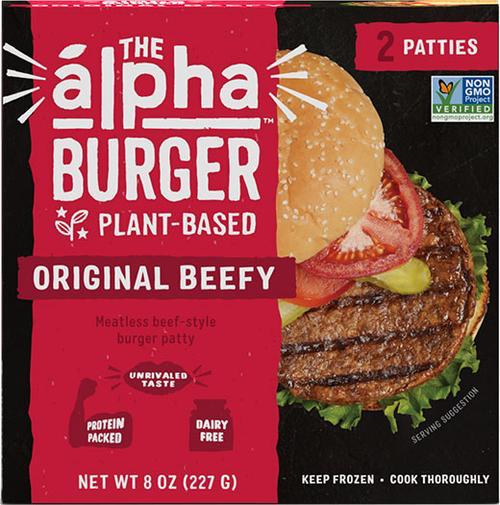
Alpha also makes an extensive line of meatless food products including chicken and beef as well as burritos. They are one of the lowest-calorie options compared to the other brands
Ingredients: Filtered water. soy protein concentrate, structured vegetable protein (isolated soy protein, wheat gluten, wheat starch). onions, onion seasoning (sea salt blend [potassium chloride, sea salt], sugar, tapioca dextrin, yeast extract, garlic powder, onion powder, dehydrated onion, grill flavor [from sunflower oil]. . spices [including celery seed], dehydrated red and green bell pepper, salt, tomato powder, molasses, spice extractive, citric acid), soybean oil, wheat gluten, less than 2% soy sauce (water, soybeans, salt, alcohol, wheat), methylcellulose, yeast extract, malt extract, seasoning (yeast extract, salt).
Macro breakdown per 4 oz burger
- 150 calories
- 8 g carbs
- 0 g fiber
- 21 g protein
- 4.5 g fat
Pros: Lowest in fat and calories of the other options which is good for people who tend to go over their fat allotment easily.
Cons: Big ingredient list! Soy, gluten, soybean oil, “grill flavor”.
Taste: There’s not much buzz about this brand online, but what I did find seems favorable.
Dr. Praeger’s Perfect Burger
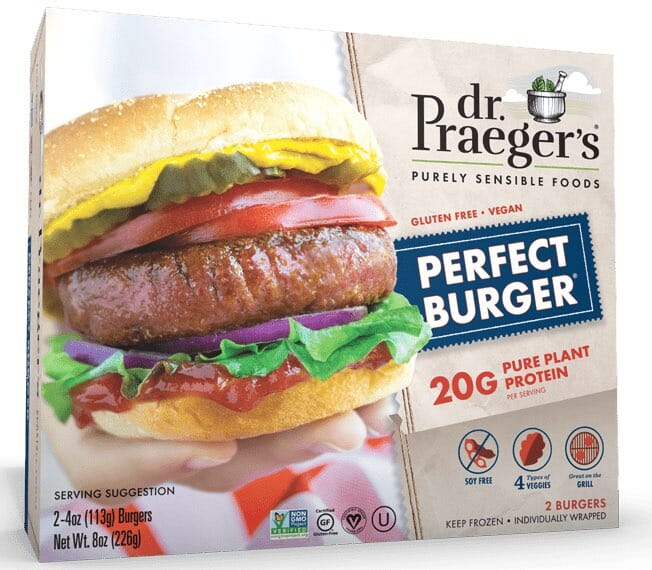
Dr. Praeger’s offers an extensive line of plant-based meat substitute products and they try to include vegetables in their products whenever possible.
Ingredients: Hydrated Pea Protein Blend (Water, Pea Protein), High Oleic Sunflower Oil, Beets, Natural Flavors, Sweet Potato Puree, Butternut Squash Puree, Carrot Puree, Methyl Cellulose, Fruit and Vegetable Juice (For Color), Oat Fiber, Sea Salt, Onion Powder
Macro breakdown per 4 oz burger
- 230 calories
- 8 g carbs
- 4 g fiber
- 20 g protein
- 13 g fat
Pros: Good macro ratio, includes 4 vegetables, no soy or gluten.
Cons: Smoke flavoring.
Taste: The taste reviews are mostly favorable. Those that didn’t like this brand complained about the smoke flavoring which is included in the “natural flavors” in its ingredient panel.
Whole Foods 365 Plant-Based Burgers
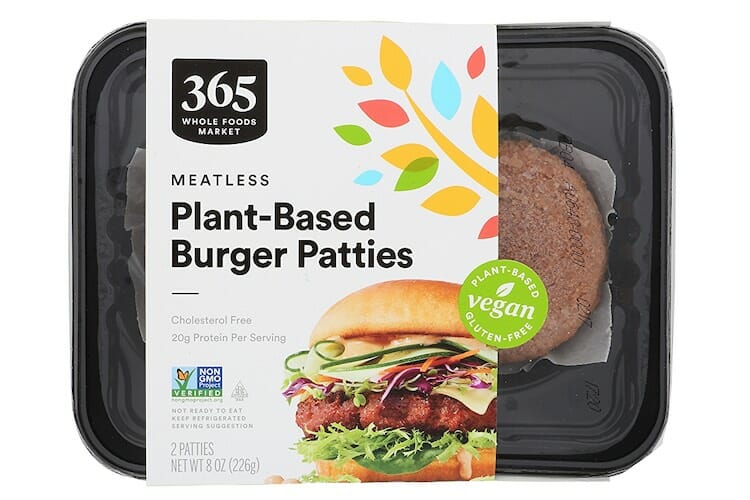
Whole Food’s 365 brand has a good reputation for producing quality products at a more affordable price. Their meatless burger attempts to follow that trend.
Ingredients: Water, Textured Pea Concentrate (Pea Protein Isolate, Pea Concentrate, Pea Fiber), Expeller Pressed Canola Oil, Pea Protein Isolate, Natural Flavors, Methylcellulose, Citrus Fiber, Cultured Dextrose, Fruit and Vegetable Juice For Color (Apple, Red Beet), Black Pepper, Onion Powder, Garlic Powder
Macro breakdown per 4 oz burger
- 210 calories
- 6 g carbs
- <1 g fiber
- 20 g protein
- 13 g fat
Pros: Good macro ratio, no soy or gluten.
Cons: Canola oil is high in Omega 6 fatty acids.
Taste: I couldn’t find many taste reviews but this food vlogger didn’t like them at all.
The Meatless Farm Co Burger
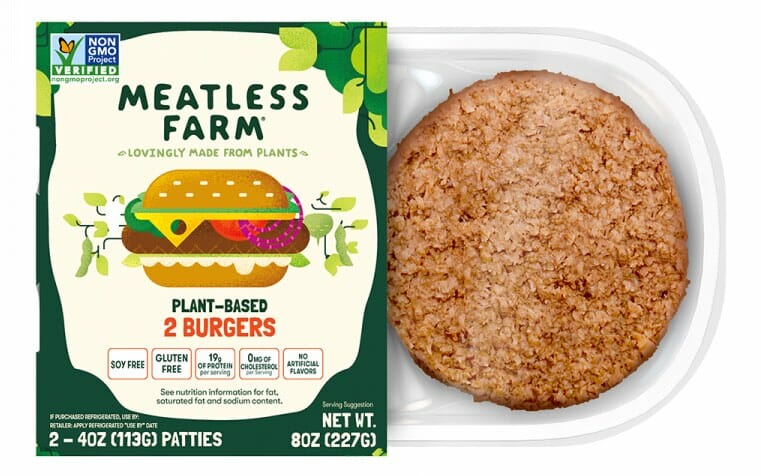
The Meatless Farm Co is another brand found at Whole Foods and a few other specialty grocers. This brand has had several versions of this product over the last year or so.
Ingredients: Water, Pea Protein, Canola Oil, Shea Oil, Methylcellulose, Less than 2% of: Coconut Oil, Rice Protein, Pea Fiber, Yeast Extracts, Caramelized Carrot Concentrate, Fruit and Vegetable Extracts for Color (Beetroot, Radish, Tomato), Natural Flavors, Potato Fiber, Potato Starch, Salt, Ground Black Pepper, Carrot Concentrate, Ascorbic Acid (Antioxidant)
Macro breakdown per 4 oz burger
- 250 calories
- 11 g carbs
- 3 g fiber
- 19 g protein
- 16 g fat
Pros: No soy or gluten.
Cons: Higher in fat, and higher in Methylcellulose which is a filler.
Taste: The older versions of this burger had mixed reviews but the latest version seems to have improved, with people mostly liking the taste and texture.
Trader Joe’s Protein Patties
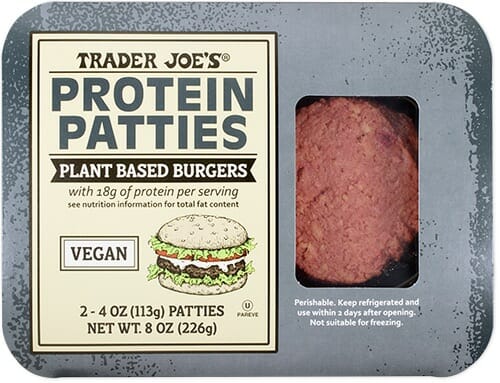
Trader Joe’s has a great reputation for producing good products at affordable prices. This is their attempt at the meatless “beef” burger.
Ingredients: Hydrated Pea Protein Blend (Water, Pea Protein, Pea Fiber), Sunflower Oil, Beets, Natural Flavors, Methyl Cellulose, Oat Fiber, Fruit Juice (Color), Onion Powder, Sea Salt, Vegetable Juice (Color).
Macro breakdown per 4 oz burger
- 290 calories
- 11 g carbs
- 5 g fiber
- 20 g protein
- 18 g fat
Pros: No soy or gluten, simple ingredients.
Cons: Fat Macro is really high and out of balance. Lowest in protein compared to other burgers. Uses regular sunflower oil which is high in Omega 6 fatty acids. Contains the most calories compared to other brands.
Taste: These have mostly favorable flavor reviews. Some describe the texture as “mushy” and not as similar to real beef as some of the other burgers here.
Price?
Thanks to all the competition, the price of these meatless burgers has dropped over the years, but they are still a little more expensive than traditional ground beef.
A beef pattie is about $1.25 per 4 oz (113 g) patty and most of these plant-based burgers are about $2.50 per 4 oz (113 g) patty.
However, the store brands tend to be cheaper and there are often sales on the major brands. When they go on sale, stock up!
Is Fake Meat Worth It?
In general, people include too much red meat in their diets and red meat is linked to an increased risk of heart disease and some cancers. Plus, raising cattle is pretty tough on the environment.
So, if these plant-based patties help people eat less red meat then I’m all for it. Should you eat them every day? No, a healthy diet includes a variety of foods and should be mostly comprised of whole foods. However, if these plant-based burgers can curb your cravings for a beef burger but with less risk to your health or less environmental impact then this is a good thing!
Also, they are a helpful way for vegan macro counters to get in their daily protein.
Which brand is your favorite?
MORE Brand Comparisons:


 How to create macro meal plans (quickly) using ChatGPT
How to create macro meal plans (quickly) using ChatGPT Calorie Deficit Meal Planner
Calorie Deficit Meal Planner Dark Chocolate: The Best and Worst Brands
Dark Chocolate: The Best and Worst Brands Macro Friendly Family Dinners
Macro Friendly Family Dinners The Best Plant-Based Burgers: Brands to Choose and Avoid
The Best Plant-Based Burgers: Brands to Choose and Avoid